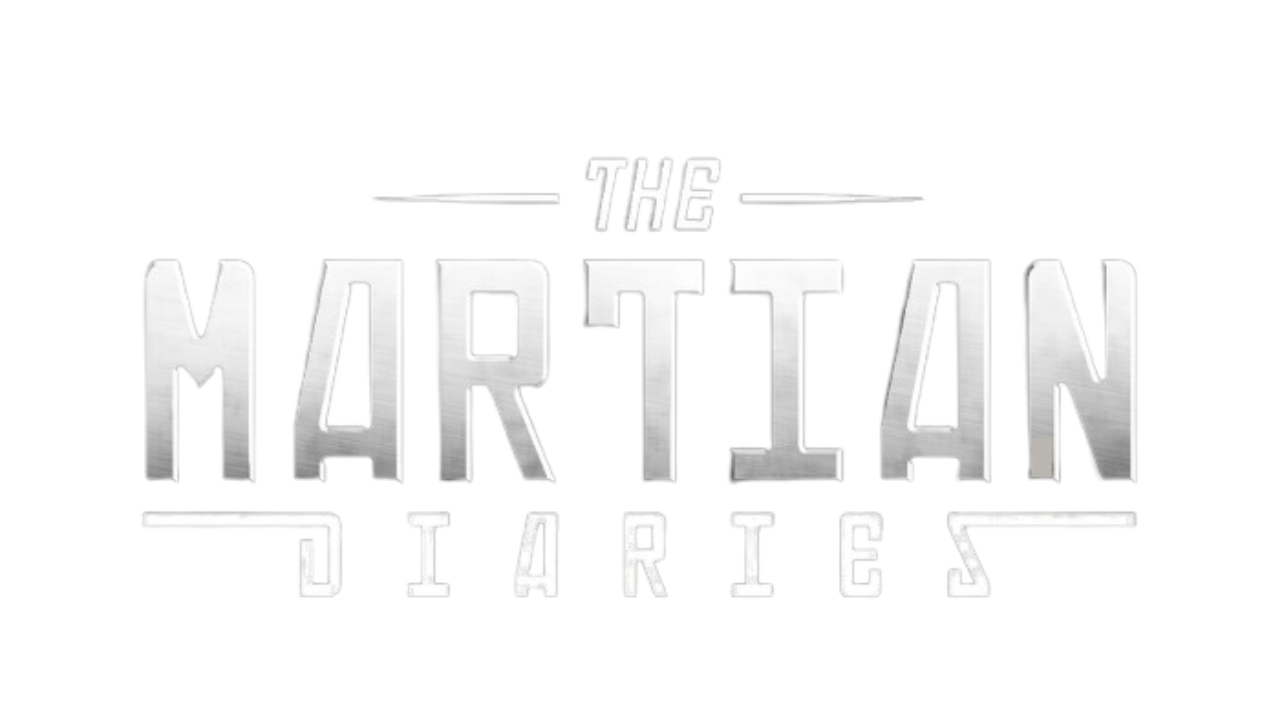
BY AUTHOR AND COMPOSER
H.E. WILBURSON
,
Q and A with The Martian Diaries series author
H.E. Wilburson
Q. What made you decide to do a sequel to The War Of The Worlds?
In the 1970s, as a child, I saw the 1953 film on TV in black and white. I was really gripped by the story, and had no idea how humans could possibly triumph in the invasion by the Martians.
Later, I found Jeff Wayne's War Of The Worlds entertaining to listen to and over the years I longed for a significant continuation of the original H.G. Wells story. In 2015 I decided to create a sequel myself and now I am always being asked "Does it turn out well for humans?" It gives me hope that perhaps I am doing something right!
I have been composing music most of my adult life, and enjoy incorporating compositions and immersive sound effects into a story to enhance the mood. That is why The Martian Diaries series has been created primarily as an audio experience. The series is also available as print books and digital ebooks, so those who would prefer to read, rather than listen, can also access the story.
Q. What is special about the Martian Diaries series?
I have based my continuation on a second, more devastating Martian invasion, aiming for a seamless continuation of the plot with characters from The War Of The Worlds. The astronomer Ogilvy, from H.G. Wells' original book, has kept a record of everything he has learned about the Martians, and his account becomes The Martian Diaries.
In volume one The Day Of The Martians, an unopened Martian cylinder, which crash-landed at the time of the first invasion, is discovered in the mountains of Wales in 1913, and transported to London for examination.
Separately, it becomes evident that the Martians are actually on their way back to Earth, in a huge armada that looks like a green comet. Ogilvy and other original H.G. Wells characters are key to my plot.
Volume two Lake On The Moon, opens with the back story of how Ogilvy survived a Martian heat ray attack on Horsell Common during the first invasion.
Then in 1919 an unexplained outbreak of Red Weed occurs in southern England, just as Ogilvy discovers that fresh water supplies are widely contaminated by mutant alien bacteria, responsible for a sinister water-borne plague that is spreading around the world.
Ogilvy is convinced that the cure for this mutated bacteria lies with a Martian super-weapon that was carried inside the 1913 comet, and which he believes is now on the moon.
His idea to locate the weapon comes to fruition in 1945 in volume three, Gateway To Mars, with an early manned mission to the lunar surface–pre-dating NASA and Apollo spacecraft. A descendant of one of the H.G. Wells characters is amongst the astronauts on the moon mission.
Two hundred years later, a shocking secret is discovered about him by early colonists on Mars, and Ogilvy's Martian diaries are once again pivotal to human survival and the continuation of life on earth.
It has always been my intention to bring H.G. Wells' story full circle and to share my interpretation of why the Martians first travelled to Earth. To me, it is important to keep the element of hope and surprise running through the series, as it does in the original The War Of The Worlds.
Q. How did you go about researching for your sequel?
Research for my idea was done using an early edition of H.G. Wells' original book as I wanted to immerse myself in the story. I also spent many hours listening to an audio version from LibriVox via librivox.org which is a great place to find quality narrations of published books that are in the public domain. Then of course there is Jeff Wayne's simple but effective musical version of The War Of The Worlds from the 1970s.
Q. How long has this project taken?
I came up with the idea of doing a sequel to The War Of The Worlds in late September 2015 and the first version of volume one was finished and recorded by early April 2016.
After a few months doing other projects, I revisited the manuscript and lengthened it. Then I re-recorded with Harry Preston as the main narrator.
Completing the manuscripts and audiobooks for the first three titles has taken me around nine years as volumes two and three are both much longer than the first. The audiobook of volume three sounds rather different to the previous two, and I hope listeners will be pleased.
Q. What inspired the music for the series? Talk about the music side of your work, your background in music and influences.
I have always enjoyed the different sounds and rhythms that can be found in all sorts of everyday situations such as washing machines, or trains on tracks. For me they conjure up pictures and ideas for projects.
I love using a variety of instruments and putting them together in unexpected ways; it could be as diverse as a harp matched with a distorted mosh pit electric guitar. I'm not too bothered about the choice of instruments used, but rather the mood they create together.
My favourite instrument to compose with is the piano because from the tone of a single note can come a new and finished piece. Inspiration can come in most unexpected ways and track 11 of volume one, 'Laura Has Gone,' was inspired by seeing a perfect spontaneous pirouette.
Although most of the tracks for The Martian Diaries series have been composed specifically, the music used for 'Arrival of the Comet' (track 15, volume one) goes way back to 1994. A more recent track, for volume three, took only two hours to create and produce from start to finish and I think it's one of my best.
I don't have a favourite music genre, I enjoy each piece for what it is. Hans Zimmer is a composer who has inspired me and one day, if possible, I would love to work with him on a score. (Dreamers do what they do, and that already sounds like a working title!)
It has always been a dream to get my music out into the world, and to do so I had to build a studio on a shoestring budget. Later, when I was on the verge of giving up the whole idea, I bought a used Mac Pro and Apple's Logic program. It was all stable and functioned superbly. Then I spent many hours learning how to produce and master my own tracks.
The sounds you hear on the radio, film and TV, whether it is music, films or plays, are delivered by sound engineers who hardly get a mention. It is ironic that the better they are, the less you are aware of their incredible skills and the amount of work they have done.
Q. Are there plans for future War Of The Worlds themed stories beyond the series?
I deliberately designed my sequel around the diary idea so that in the future I could insert short spin-off stories featuring some of the characters.
Since finishing volume three of The Martian Diaries I have written Ogilvy 1913, which is the personal diary of Ogilvy the astronomer, and a companion book to volume one, The Day Of The Martians.
It details his involvement in transporting the unopened Martian cylinder to London, and reveals his vital role in the response to the invasion of 1913. A fifth book, to follow on from book 3 Gateway To Mars, is in the pipeline.
Q. What other projects have you done?
Composing music has always been in the background of my life. My first attempt at a project combining text with music was my own adaptation of The Pilgrim's Progress by John Bunyan, which I did a couple of years before starting The Martian Diaries. I am hoping to release it in the future.
I also have several hundred pieces of music that I would love to see used in some way. The Martian Diaries has been my main focus since 2015 and the biggest project I have created to date.
Q: What are the best ways for readers to find you online?
On social media I am most active on X (formerly Twitter) which is a great place to connect with creative people and anyone interested in space, Mars astronomy, and science fiction.
You can find me here: https://twitter.com/martiandiaries @martiandiaries
Joining my email list via the website https://www.martiandiaries.com is another way of getting updates on new releases, special offers and events.
You can email me here:
mail@martiandiaries.com
Readers who follow my author pages on Amazon and BookBub will be alerted when I release a new book.
I can also be found on other social platforms:
Goodreads https://www.goodreads.com/author/show/17716393.H_E_Wilburson
Pinterest https://www.pinterest.co.uk/Martiandiaries/
Facebook https://www.facebook.com/martiandiaries/
Awards
The Eric Hoffer Book Award 2025, Category Finalist - The Martian Diaries, vol. 1 - The Day Of The Martians.
Bronze Medallist 2024 Readers Favorite International Book Awards, Fiction Audiobook category - The Martian Diaries, vol. 1 - The Day Of The Martians.
Finalist in the 2024 IAN Book Of The Year Awards, Novella category - The Martian Diaries vol. 1 - The Day Of The Martians.
The Martian Diaries vol. 2 Lake On The Moon audiobook - 3rd place in the TCK Publishing 2020 Readers Choice Awards - Science Fiction category.
The audiobook versions of the above titles were entered into the Los Angeles Science Fiction Film Festival Awards 2020 and together they won the following:
Star One Gold Award for Best Audio Drama
Europa Prize Gold Award for Best Writer
Polaris Gold award for Best Sound Mix
Polaris Silver Award for Best Soundtrack
Asimov Gold Award
All three audiobooks have been awarded 5 stars by Readers Favorite Reviews. Of book 1 The Day Of The Martians, the reviewer said, “This was more than an audiobook. This was, in many ways, a wonderfully executed tribute to H.G. Wells.”
Of book 2, Lake On The Moon, another reviewer said, “The storyline is mesmerizing, and Mr. Wilburson has done a magnificent job of melding his story with the original War Of The Worlds.”
The reviewer of book 3, Gateway To Mars said, "The soundtrack composed by H.E. Wilburson deserves special praise, as it created an atmospheric background that fed my imagination alongside Paul's awesome narration. I highly recommend this flawless production to sci-fi, action-thriller, time travel, and adventure fans."
Broadcasts
The Martian Diaries vol.1 The Day Of The Martians was shortlisted twice for the International Radio Drama Festival in 2020 and 2021, and hosted on their website https://radiodramafestival.org.uk
The Day Of The Martians was first broadcast live in May and June 2019 by Radio Woking, the town where H.G. Wells lived while writing The War Of The Worlds and where much of his iconic science fiction story is set.
There are several sculptures in Woking, relating to the alien invasion in the book, including the 7 metre high stainless steel Martian tripod by sculptor Michael Condron. A separate plaque commemorates Woking as 'the birthplace of modern Science Fiction'.
Radio Woking broadcast The Day Of The Martians a second time, followed by Lake On The Moon, in ten x 40 min episodes on Sundays at 6pm GMT from 15th Nov 2020 to10th Jan 2021.
Listen or catch up online http://www.radiowoking.co.uk/listen
Channel Radio 2 broadcast The Day Of The Martians in three x 40 minute episodes in February 2020 in the Clive Looker Sunday Arts Hour, 2-3pm GMT
https://www.channelradio.co.uk/two
Presenter Clive Looker has had a long and varied career in media as a freelance writer for magazines in the UK and US, and as a contributor and active writer for BBCTV and Radio.
